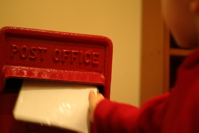Speeding Your E-mail
There has been a big increase in the amount of e-mail I am receiving of late. It has prompted me to revisit my rules for dealing with it. Here are three simple rules to get you through the interminable torrents of e-mail that much more efficiently.
The first e-mail rule: Touch each e-mail message but once.
Unless it is an message that you want to re-read for enjoyment, you don’t want to waste your time by reading a message multiple times.
- Delete messages straight away.
If the e-mail is going to end up deleted, it is better to delete it sooner rather than later. This minimises the risk of reading it twice, and wasting your time. I keep deleted e-mails for at least a month, which means I can recover if I do get a little over enthusiastic with the delete key.
- Quickly delete messages.
Pushing the delete idea even further, speed deleting is especially useful for junk e-mail. You don’t even need to read the whole e-mail. Delete it in 10 seconds, rather than spending a minute reading it, mulling what you would do with the ten million dollars this nice stranger if offering to transfer into your bank account from a recently deceased king/general/prince. It will win you 50 extra seconds to do something useful! Given the number of these I have been getting recently, that’s worth about an hour a week to me. A word of caution here, don’t apply this technique to emails that might not be junk, tempting as it may be.
- Minimal filing.
I still encounter people that have e-mail dutifully filed e-mails in 100 or more folders. I used to me one of these poor individuals, until I woke up one day and said “why am I spending my time like this?”. The method is rarely time efficient for two reasons:
- The sorting of the mail is cumbersome and time consuming at this level, especially compared with how often the e-mails are retrieved.
- E-mails rarely fit into one of these 100+ categories exclusively, and so they end up at least partially misfiled.
- E-mail rules can automate this filing, if it is really that necessary.
It is far better to have a minimal number of folders, then use the search facility of your e-mail software to find what you need, when and if you need it. This will be more time efficient, as well as saving ware and tare on your mouse and your brain, working out how to file everything.
The second e-mail rule: Don’t leave actionable e-mails with unactionable ones
- Move it out.
Avoid storing actions in the inbox at all costs. Unless you are a very light user of e-mail, they will get buried. Although I may sometimes e-mail myself an ‘action’ from time to time, these are actioned straight away or moved to a proper action list as soon as possible. This avoids ending up having to hunt through a swathe of e-mails trying to find the one that was actionable, or even worse, completely forgetting about it.
- Action it now.
If you can action the message now, then do. It may just be a matter of a short reply or forwarding on to someone else. It is much better to do these little tasks (1-2 minutes) straight away, than run the overhead of managing them as tasks. You’ll be amazed how much you can actually do in a minute or two, and how much this simple principle de-clutters an inbox.
- Put it in the diary.
If the e-mail is going to take more than a few minutes, then write time to process it into your diary, so that you book time to deal with it, and so that you remember to deal with it. In Outlook and some other e-mail clients, you can drag the message straight into the diary. This is also useful feedback about how overloaded you are. Likewise, if the e-mail is to do with an event, meeting or something else that belongs in the diary, write it in straight away. This minimises the chances of being double booked, and the associated stress.
The third e-mail rule: E-mail unto others as you would have them e-mail unto you.
It took me a long time to get to this one. It isn’t just a moral principle, it is a way of modelling the e-mail behaviours you expect to other people. Think before forwarding. Think before replying. Would it be better to schedule a call or exchange a quick IM message? Who needs to be cc’ed, if anyone. It is amazing how effect this is, and leads on to why writing efficient e-mails is so important.
It is always good to discover new e-mail hacks, as e-mail is such a time sink for so many these days.



[…] Speeding Your Email-WOWNDADI Tells how you can eliminate any unnecessary messages that are cluttering up your inbox. The author recommends deleting irrelevant messages right away and separating actionable emails from unactionable ones. […]
[…] Speeding Your Email-WOWNDADI Tells how you can eliminate any unnecessary messages that are cluttering up your inbox. The author recommends deleting irrelevant messages right away and separating actionable emails from unactionable ones. […]
[…] Links of Interest from Productivity 501 – featuring Speeding Your Email. […]